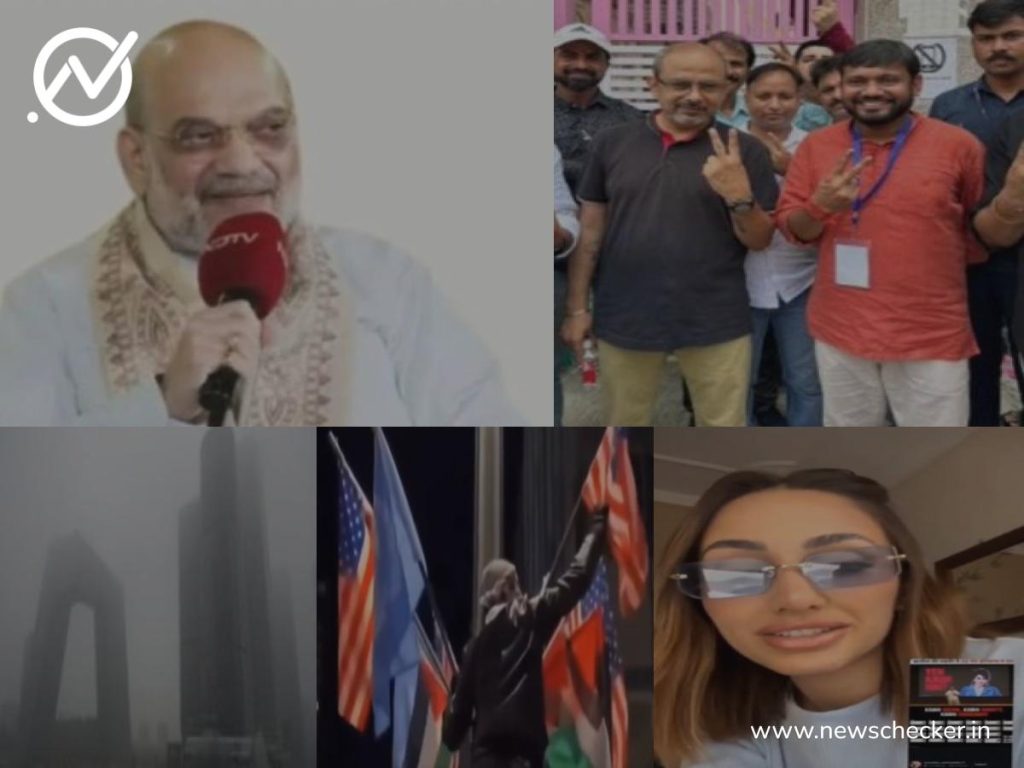Listen to the article
In a week dominated by election-related disinformation, social media platforms have seen a surge of misleading content targeting political figures and exploiting public concerns about pollution and voter fraud. Fact-checkers have been working overtime to debunk these claims as they spread rapidly across digital channels.
A fabricated news card purportedly from NDTV has been circulating widely on social media, falsely attributing an inflammatory quote to Home Minister Amit Shah. The manipulated graphic shows Shah supposedly claiming that “All the activists on social media, no matter which party they belong to, are surviving on our 5kg of ration!” Fact-checkers at Newschecker have confirmed that Shah never made such a statement, highlighting how easily digital media can be manipulated to create convincing but entirely fictional political narratives.
Meanwhile, Congress leader Rahul Gandhi found himself at the center of another misinformation campaign after his press conference on alleged voter fraud. Gandhi had presented the case of a Brazilian woman whose photo was allegedly used in voter fraud in Haryana, referring to the incident as “vote chori” (vote theft). Shortly afterward, a video of Brazilian hairstylist Larissa Nery went viral with claims that she was mocking Gandhi and calling him a “failed politician.” Newschecker’s investigation revealed this narrative to be false, with the video being taken out of context to create a misleading political attack.
The ongoing Bihar Assembly elections have also generated their share of misinformation. Congress leader Kanhaiya Kumar became the target of accusations of “double voting” when social media users shared photos claiming he had voted both in Delhi during the 2024 Lok Sabha elections and again in the current Bihar polls. The claim suggested serious electoral malpractice, but fact-checkers determined the allegation to be misleading after a thorough investigation of the voting records and circumstances.
Environmental concerns have not escaped the wave of misinformation either. As air quality in the Delhi-NCR region continues to deteriorate to dangerous levels, dramatic images purportedly showing Noida and Faridabad shrouded in thick smog have been widely shared across platforms. These striking visuals, which show cities virtually disappearing under pollution, were presented as evidence of India’s worsening air quality crisis. However, fact-checkers discovered that these images were actually taken in China years ago and have no connection to the current pollution situation in India’s capital region.
In the wake of Zohran Mamdani’s recent electoral victory, a video claiming to show a Muslim man removing an American flag in New York has gained traction online. The video was framed as evidence of concerning behavior following Mamdani’s win, playing into existing tensions and stereotypes. Newschecker’s investigation revealed that the footage is actually from 2023 and completely unrelated to Mamdani’s election, demonstrating how old content is frequently repurposed to fit current narratives.
These instances highlight the sophisticated nature of modern misinformation, which often combines elements of truth with fabrication and frequently exploits existing social divisions or concerns. The techniques employed—manipulated graphics, decontextualized videos, repurposed imagery, and false attribution—represent common tactics in the digital misinformation landscape.
As election seasons tend to intensify the spread of misleading content, media literacy experts recommend that users verify information before sharing, check the sources of claims, and be particularly wary of content that triggers strong emotional responses. Fact-checking organizations continue to play a crucial role in identifying and debunking false claims, but the volume and velocity of misinformation remain significant challenges in maintaining a well-informed public discourse.
Fact Checker
Verify the accuracy of this article using The Disinformation Commission analysis and real-time sources.




8 Comments
The fabricated news card attributed to NDTV is a prime example of how easy it is to create convincing but entirely fictional content these days. I’m glad the fact-checkers were able to confirm that Amit Shah never made that statement.
Verifying the authenticity of digital media content is crucial, especially when it comes to politically charged issues. The public needs to be vigilant and cross-check information from reliable sources.
The case of the Brazilian woman’s photo being allegedly used in voter fraud in Haryana is quite troubling. I’m curious to know more details about this incident and how the fact-checkers were able to investigate and confirm the misinformation.
Voter fraud is a sensitive issue, so it’s critical that any claims are thoroughly verified before being reported on. I hope the fact-checkers were able to provide a clear, evidence-based explanation of what actually happened.
This is a concerning trend of misinformation spreading rapidly online, especially around political figures and sensitive issues like elections and voter fraud. It’s crucial that fact-checkers work quickly to debunk these false claims before they gain too much traction.
Manipulated graphics and fabricated quotes can be very convincing, which makes it all the more important for the public to be cautious and verify information from credible sources.
It’s disheartening to see how quickly misinformation can spread, especially when it targets public figures. I appreciate the efforts of fact-checkers to debunk these false claims, but the speed at which they need to work is concerning.
Misinformation around elections and voter fraud is particularly concerning, as it has the potential to undermine trust in the democratic process. I hope the fact-checkers continue their diligent work to expose these false claims and maintain transparency.